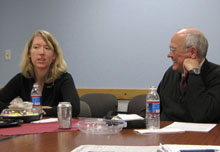Event
Amanda Michel: Networked reporting a ‘tremendous resource’

December 1, 2009 — As ProPublica‘s editor of distributed reporting, Amanda Michel differentiated between “networked newsgathering” and “citizen journalism” at a Shorenstein Center brown-bag talk.
According to Michel, “the term ‘citizen journalist’ has done a real disservice” to the journalism profession. It has “evoked a platonic ideal of someone who is a substitute good … someone who can readily take the place and position of any one journalist at any given moment.” Michel found something much different in her experience with Off the Bus, a Huffington Post project that provided citizen coverage of the 2008 U.S. presidential campaign. Only a small percentage of Off the Bus members participated in the writing of material, she said. Instead, most contributed to the research and reporting.
Michel outlined several collaborative reporting projects that have taken advantage of a networked approach to reporting news. She acknowledged that these techniques are “not good for all kinds of stories,” particularly ones that require in-depth analysis, but they are “helpful in bringing in a lot of information” and finding “trends that you may not otherwise see.”
Michel noted that networked journalism “underscores a tremendous resource that the media has, which is the public’s willingness to participate and help cover events.” And with the right standards, there is “huge potential for reporting.”
To verify information from volunteer reporters, Michel depends on having a wide and often overlapping range of sources. The projects are “self-selecting,” Michel said, so that people tend to report from their own areas of interest and expertise. Networked journalism “works to identify trends,” and “does not base a story on one account.”
Although many traditional news organizations have not yet adopted networked reporting, Michel argued that “these techniques aren’t new.” They are helping to “organize people to report stories that would be beyond the capacity of single reporter,” while still making use of traditional journalism. She recognizes that there is a “cost to experimenting,” but there’s also “a need to showcase the work [of networked journalists] more so that it’s more accessible.”
This article was written by Janell Sims and the photos were taken by Leighton Walter Kille, both of the Shorenstein Center.